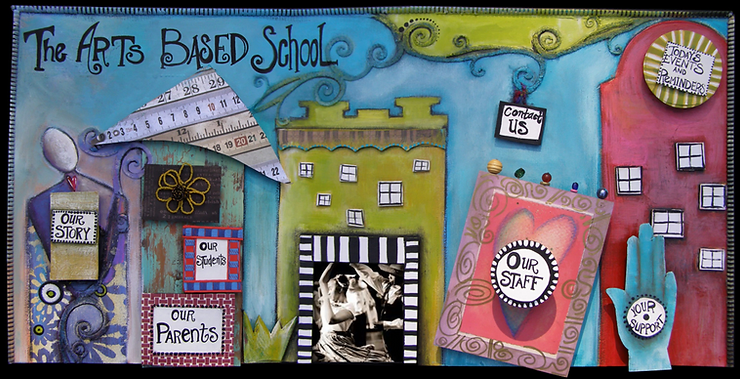Music Production – The Arts Based School
During the week of May 13, 2019, KRE8ivU received an invitation to conduct music production sessions at the Arts Based School in Winston-Salem, North Carolina, as a part of a pilot program.

On the week of May 13, 2019, KRE8ivU was invited to run the Music Production/Beat Making classes at the Arts Based School in Winston Salem, NC, as a pilot program. The purpose was to see how the KRE8ivU program could be integrated into the school’s programming. To do this, we saw several classes for about 45 minutes twice a week. The first class was an introduction to computer software, and in the second class, they finished a small project.
The students had a great time having fun creating music and learning how to record. At the same time, we witnessed them working in groups and motivating each other.
The program has been a success…
Please read what Mary Siebert, Arts Director for ABS, had to say.
Published on May 16, 2019 for the Arts-Based School Community
How We Do It and Why
By Mary Siebert
“I’m scared. Wait! It’s super cool! I got this!” Reluctant ABS 8th grader during music tech class
This week, all ABS students in 6th, 7th, and 8th grades have been visited by teachers from KRE8ivU, a Lexington-based company that introduces young people to music production. The founder of KRE8ivU is Douglas Green, an optimistic, super-dynamic man with years of experience in music and music production, having worked alongside some of the greats in the American popular scene. KRE8ivU offers after-school and summer school courses, and Mr. Green reports dynamic leaps in interest and skills when his students are introduced to software designed to mimic the professional recording studio. He is excited to offer classes during the regular school day because he knows this program ignites interest among students of every skill set. In our classes, we are seeing the kind of enthusiasm he predicted, with students rapidly dipping into the process of music production at varied levels of expertise and skill.
Studies indicate that students nationwide have been losing interest in music classes due to cultural changes, a lack of access to instruction or instruments, and a lack of parental resources or commitment.Music has been a required subject in the U.S. since the bipartisan Every Child Achieves Act passed in 2015. But where music classes are available in public schools, they rarely include all students past elementary school. Instead, the arts typically become electives beginning in middle school.
At ABS, we have experimented with the required band and/or chorus through the 8th grade, but the wide disparity of skills and interests prevented us from meeting the “creative” goals required by the state, such as composing, improvising, arranging, and producing original pieces. Parents and students have enthusiastically embraced this year’s required band at the fifth grade level, introduction to violin at the fourth grade level, and after-school programs, but we are still debating the best way to present music instruction in required upper-grade classes.
High school music teachers in the U.S. are reporting renewed energy and interest from students when elements of contemporary popular music are introduced, such as electronic composition and recording skills. The popular music industry requires advanced technology during creation, recording, and live performance, so it makes sense to incorporate these skills into music classes. We wanted to give it a try.
There are daunting challenges: expensive hardware and software, instructor’s familiarity with these materials, and unique procedures for including all students. Music teachers are not typically technology teachers too; they have spent many years mastering both the instruments they play and the skills required to teach them. It can be frustrating, even insulting, to a musician when pre-composed “loops” and “beats” are easily layered via a drag-and-drop software program called “composition.” The essential knowledge of musical elements and skills in these programs is left to the programmer, much as knowledge of the basics of electricity is unnecessary for flipping a switch to turn on a light.
But if we can provide access to these contemporary processes and skills for our students, something new happens, which we are seeing first-hand this week during our visit from KRE8ivU.
ABS music teacher Angie Allen has boldly taken a quick dive into the use of the equipment and software used by KRE8ivU. After one introductory lesson from Mr. Green, she stepped in as the second instructor in the room. Ms. Allen quickly embraced these tools, constructing appealing procedures to engage and include every student. She remarks enthusiastically that some students who are otherwise typically disinterested and even distracting were captivated and were problem-solving with lightning speed. As varied layers of sound were laid into their composition, Ms. Allen noted the multiple music goals that students were implementing to make decisions. As one team played examples of their work, onlookers cheered them and responded with descriptions of the result, which, given more time, could easily be spun into a related lesson in writing a critical review—another state-required goal.
We are interested in including music technology in our middle school program on a regular basis, and this visit from KRE8ivU gives us a great opportunity to consider how that could look. Acquiring the equipment is financially challenging, but we will be investigating resources to help us. One of the most important reviews of the experiment so far was Ms. Allen’s comment yesterday: “They LOVE this!”
Students should love education, we have a program that will help students develop soft skill-sets needed for a lifetime of success, our program produces successful students while having fun.

